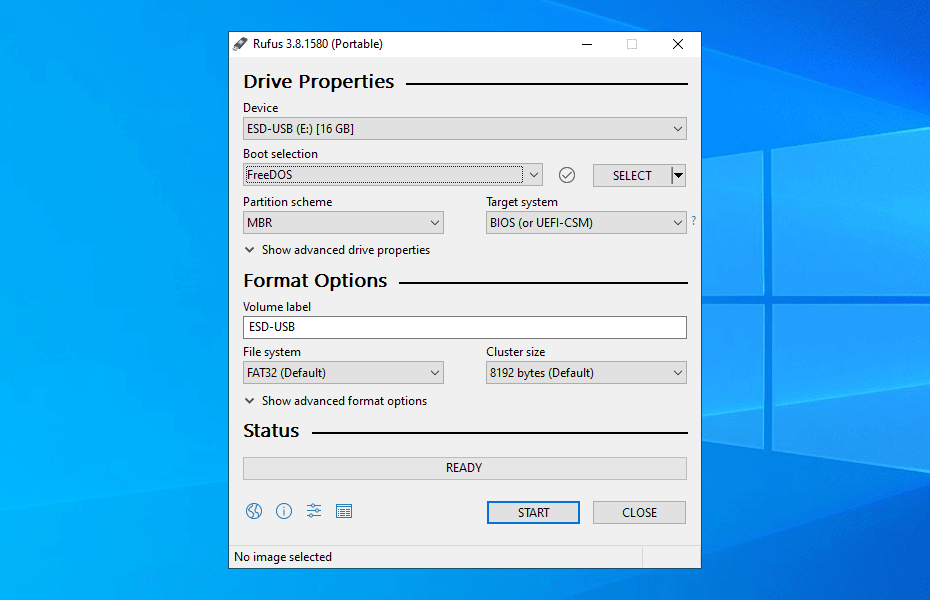
- #HOW LARGE IS RUFUS OS PORTABLE#
- #HOW LARGE IS RUFUS OS SOFTWARE#
- #HOW LARGE IS RUFUS OS CODE#
- #HOW LARGE IS RUFUS OS ISO#
Unlike Rufus, Etcher is a true cross-platform tool, it runs with ease across MAC, Windows or Linux platforms. Simply put, Rufus is not a cross-platform application and is only compatible with Windows, making it lack a lot of bonus points here. Rufu uses its goodwill at a major share to gather the trust and usage. This is such a big and considerable point to discuss since Rufus having such a huge community with positive feedback lacks in the compatibility across different Operating systems. While Rufus is developed using C language, Etcher is developed using Electron Framework which is basically an amalgamation of web technologies such as JS, HTML and CSS. Rufus offers a straight win by supporting 38 languages like English, Spanish, Arabic, Korean many more, while Etcher only supports the English language.
#HOW LARGE IS RUFUS OS CODE#
Also, the source code of both is publicly available to use and modify for developing further applications.
#HOW LARGE IS RUFUS OS PORTABLE#
It can be used to run on all three OS- Windows, MAC and Linux.īoth the tools are open-source and are available in portable version too.

Etcher’s community is always updating the application with stable releases. It was formerly called Etcher, but Resin.io changed its name to BalenaEtcher in 2018. It is compatible to run on Windows 7 later versions.īalenaEtcher is developed by Balena which is licensed under Apache 2.0. There has been many versions since 2011, the latest one is 3.13 which is only 1.1MB in size. The first official release of Rufus was done in December 2011, with only MS-DOS support. Rufus ( The Reliable USB Formatting Utility, with Source) is a free tool that was created by Pete Batard which was primarily created to generate MS-DOS bootable USB flash drives. I will be covering the following broad categories to mark the key difference and similarities between the two, and my preferred choice based on that particular aspect: Now we will proceed ahead with the in-depth differences between both the applications and what one should prefer based on all the observations and technicalities that we will come up with during our analysis. It also supports flashing of live CD versions of Clonezilla, DRBL, GParted or Tux2live. Etcher is developed by Balena which is licensed under Apache 2.0. Its primary function is to copy the image files of an OS to a micro SD card or to a USB drive. It is an easy-to-use, free and open source GUI software. This is where Etcher wins the play, it is extremely popular since it is the most cross platform application running on Windows, MAC, and Linux, with its superior functionality and usability. The only drawback which makes it lose on big play is its compatibility issues, users can’t just get stuck to this and they ultimately have to hunt again to find a true cross-platform application. Due to compact size of the application and extremely quick flashing, it is a favoured choice of many.
#HOW LARGE IS RUFUS OS ISO#
Rufus– The software, while is only compatible to run on Windows as of now, offers a tough competitor to Etcher because it supports various image formats including Windows ISO files and Linux distros. Let us step further and dissect every possible difference, similarity they have to offer and what should you ultimately choose to use.
#HOW LARGE IS RUFUS OS SOFTWARE#
Also, both the software might feel pretty similar on the superficial layer, but there are huge differences that they offer in respect to functioning, portability, UI, compatibility and many more.


Etcher, and it’s well-known contender, Rufus, are currently ruling the sector of Bootable USB drive creators because of the accessibility, pleasant user interface and quick hassle free functioning, which means IT WORKS!īoth the tools have a large community base of active users since both of them offer an adaptable user interface(UI) and dominate the market because of how sufficient they are. Are you confused about which application to choose and trust for creating your bootable USB? I got you! Here is an insightful guide which compares two of the most famous competitors dominating the market.


 0 kommentar(er)
0 kommentar(er)
